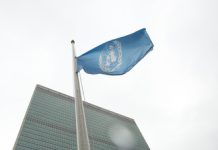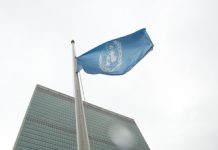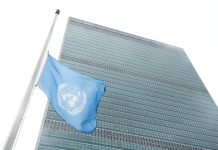Lebanon: Desperate scenes at Syrian border after Israeli airstrikes
After another night of heavy Israeli bombing in Lebanon, UN humanitarians described how people desperate to flee the violence found the country’s main border crossing into Syria cut by a new dawn strike.
Many were forced to skirt “a huge crater” and rubble on foot, to reach Syria, said Rula Amin, a senior communications adviser with the UN refugee agency, UNHCR:
“There were two strikes and a huge crater was created in the no-man’s land between the Syrian and the Lebanese side. It’s very hard for vehicles still to go through this road…and we could see that some people were taking this road, walking, desperate to leave Lebanon, and so they walked actually through that destroyed road into Syria. And they did cross.”
Between 21 September and 3 October, some 235,000 people have crossed into Syria overland – 82,000 Lebanese and 152,000 Syrians – according to the UN migration agency IOM.
Head of IOM in Lebanon, Mathieu Luciano, warned that the conflict “is intensifying”, adding that 400,000 people have been displaced in the last two weeks alone, amid ongoing Israeli military operations in Lebanon, including ground incursions in the south.
Marshall Islands’ nuclear legacy in spotlight at Human Rights Council
To the Human Rights Council, which has been focusing its attention on the nuclear testing legacy in the Marshall Islands, which representatives from the Pacific nations say have left their people with some of the highest rates of cancer in the world.
Sixty-seven known nuclear tests were conducted by the United States between 1946 and 1958 in the Marshall Islands, according to a report by the UN human rights office, OHCHR.
It noted that those tests were equivalent to detonating more than 108 million tons of dynamite; the consequences of this toxic legacy “are still painfully present”, said UN Deputy High Commissioner for Human Rights, Nada Al-Nashif:
“During consultations, OHCHR heard harrowing accounts of the historical and ongoing impacts of nuclear testing: stories of radiation exposure and the proliferation of cancers, of painful memories of miscarriages, stillbirths, and of what some Marshallese refer to as “jellyfish babies” – infants born with translucent skin and no bones.”
During a moving debate, the Human Rights Council heard testimony from Ariana Tibon-Kilma, Chair of the National Nuclear Commission of the Marshall Islands.
She described how the nuclear testing happened against the wishes of the Marshallese and how only hours after a detonation, people itched off their own skin and mothers watched as their children’s “hair fell to the ground and blisters devoured their bodies overnight”.
The islander explained how those relocated were then subjected to a medical testing programme lasting more than 40 years which included the removal of healthy teeth, bone marrow and other body parts, “to be stored in a laboratory for research purposes”.
To remedy this and many other damaging consequences of nuclear testing on the sprawling chain of islands and atolls, Ms. Al-Nashif insisted that “uncovering the truth” and filling gaps in the factual record of the US programme were key to justice, accountability, reparations and reconciliation.
She underscored the OHCHR report’s recommendation that the Marshall Islands along with the US, the UN, the international community, and non-State actors, consider creating special mechanisms for “truth and non-repetition”, and to support a transitional justice-driven approach, to address the nuclear legacy.
WHO approves first mpox diagnostic test for emergency use
The UN World Health Organization (WHO) has approved the first mpox diagnostic test for emergency use, it announced on Friday.
The mpox test will provide immediate results and is described as “pivotal” in stopping the continuing spread of the deadly virus, previously called monkeypox.
“Early diagnosis of mpox enables timely treatment and care, and control of the virus,” WHO said, adding that limited testing capacity and delays in confirming mpox cases persist in Africa and that this has contributed to the ongoing transmission of the disease.
So far this year, more than 30,000 suspected cases of mpox have been reported across Africa but only 37 per cent of cases in the Democratic Republic of the Congo where numbers are highest were confirmed via a test.
The Alinity test can detect both types – or clades – of mpox in the DNA taken from people suspected of being infected.
Daniel Johnson, UN News
Music composed and produced by Joachim Harris. All rights reserved.
Source of original article: United Nations (news.un.org). Photo credit: UN. The content of this article does not necessarily reflect the views or opinion of Global Diaspora News (www.globaldiasporanews.com).
To submit your press release: (https://www.globaldiasporanews.com/pr).
To advertise on Global Diaspora News: (www.globaldiasporanews.com/ads).
Sign up to Global Diaspora News newsletter (https://www.globaldiasporanews.com/newsletter/) to start receiving updates and opportunities directly in your email inbox for free.
































